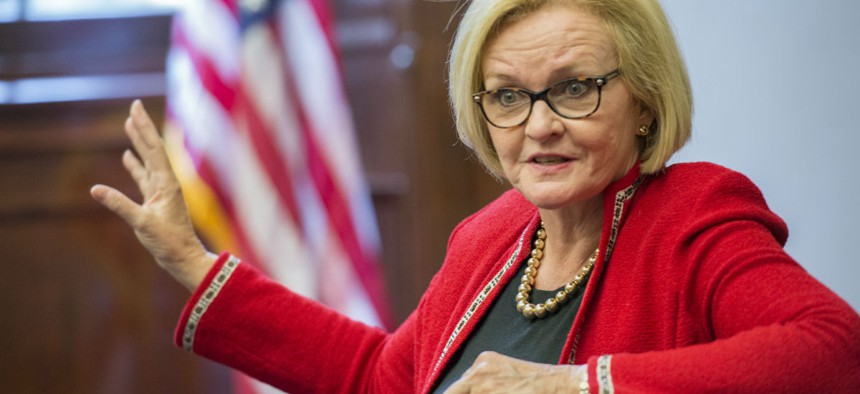
Sen. Claire McCaskill, D-Mo., spearheaded the Senate resolution. Flickr user Senator Claire McCaskill
Dozens of Senators From Both Parties Push Measure to Block Trump's USPS Privatization Plan
Senators join 190 House members in opposing the proposal.
A bipartisan group of senators representing more than one-quarter of the upper chamber this week put forward a measure to block the Trump administration from moving forward with its plans to privatize the U.S. Postal Service.
The resolution (S.Res. 633) follows a companion in the House introduced this summer with 190 signatures from members of both parties, including more than three dozen Republicans. The measures are in response to a proposal in President Trump’s plan to reorganize government to privatize USPS, which the White House said should occur after the agency gets back on firmer financial footing. The plan has been met with widespread, and bipartisan, rebuke.
The Senate resolution was spearheaded by Sen. Claire McCaskill, D-Mo., and included five Republican cosponsors. They noted USPS already does not receive taxpayer funds, employs more than 500,000 workers, plays a critical role in the growing e-commerce industry and enjoys high favorability ratings, in suggesting the Postal Service remain “an independent establishment of the federal government and not subject to privatization.”
McCaskill said the Postal Service was the “backbone of our rural communities” and vowed to fight against any effort to terminate its status as a government agency.
“The incentives simply aren’t there for private companies to take mail that last mile for people living in rural communities,” McCaskill said, “and I’m going to fight tooth and nail to ensure that every Missourian—whether in a small town or big city—has access to the critical services the Postal Service provides.” McCaskill earlier this year cosponsored a bipartisan bill to reform USPS by removing many of its liabilities and enabling it to pursue new lines of business, while keeping it a part of the federal government.
The Trump administration has argued postal customers would be better served if USPS were not associated with the government.
“A privatized Postal Service would have a substantially lower cost structure, be able to adapt to changing customer needs and make business decisions free from political interference, and have access to private capital markets to fund operational improvements without burdening taxpayers,” the White House said in its reorganization plan. “The private operation would be incentivized to innovate and improve services to Americans in every community.”
The Postal Service itself has expressed an openness to the plan. Postmaster General Megan Brennan said shortly after Trump unveiled the plan that her primary concern was only that Congress allow her agency to fix its “flawed business model.”
“Ultimately, it will be for Congress to decide whether the best path to financial sustainability is to preserve the Postal Service status as a government institution focused on our mission of public service, while giving us more authority to meet our responsibilities, or whether a profit-maximizing corporate model is preferable,” Brennan said.
Trump issued his plan as a task force he created was working on a report with recommendations for fixing the cash-strapped Postal Service. That group, led by the Treasury Department, has delivered its findings to the president, but is not expected to make the report public until after the midterm elections in November.
“The USPS task force briefed the president [in August] on the preliminary findings and recommendations that were delivered,” a Treasury spokesperson said. “The task force will continue our work to identify solutions to strengthen the USPS business model driving toward a public report before the end of the year. It is clear that the governance of USPS must be fixed and we encourage Congress to take actions towards that goal.”
The resolution, if approved in Congress, would mark the latest in a series of actions lawmakers have taken to block pieces of Trump’s reorganization plan from taking effect. They recently sent a spending bill to Trump's desk for his signature that included explicit prohibitions on certain reform proposals.







